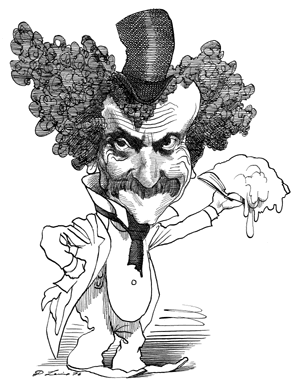Much has been written about the reasons for Vonnegut’s appeal to the first television generation. The time-tripping, the McLuhanite non-“linearity,” the pacifism, the jokes, the sci-fi inventiveness, the quick sympathy for life’s losers and has-beens—these have all been repeatedly cited and have evoked little disagreement. But there is a more interesting question. Why has Vonnegut encountered such strong and continued resistance from so many literate members of his own generation, which may be extended to include serious readers from thirty to seventy? Why should a well-educated, highly intelligent magazine editor confess to me that she has been unable to finish a single Vonnegut novel? Why should a first-rate college teacher I know—sympathetic to the young, open to new experience—complain vehemently when compelled to include Slaughterhouse-Five in an introductory course? After all, the elements that endear Vonnegut to his cult are not in themselves antipathetic to older readers who cherish Catch 22, love the Beatles, and feel themselves magnetized by the phallic hardware of Gravity’s Rainbow.
An examination of Slapstick cannot by itself provide a satisfactory answer, for the novel is too obviously vulnerable. A few things may be said in its favor. I found the autobiographical opening interesting and even touching in its account of Vonnegut’s relationship to his scientist brother, his dead sister, and his roots in Indianapolis. The story of Dr. Wilbur Daffodil-II Swain—first encountered as a hundred-year-old man sitting in a clearing in the ailanthus jungle that was once Thirty-fourth Street—has its moments of goofy charm. Some of the futuristic bits of whimsy are fun to read about: a depopulated, ruined New York, where, because of fluctuations in gravity (possibly produced by the Chinese), even the centenarian Dr. Swain can, on certain days of light gravity, have an erection and imagine scampering to the top of the Empire State Building and flinging a man-hole cover to New Jersey; or the United States after the final energy crisis, when the country has broken up into warring dukedoms and kingdoms rather like Western Europe in the fifth century AD.
More to Slapstick’s credit is the section dealing with the childhood of Swain and his dizygotic twin sister Eliza. Vonnegut can always be counted on to empathize with the plight of the rejected child confronted by unapprehending or frightening parents. In this case the twins are repulsively ugly neanderthaloid monsters, while the parents are sweet, well-meaning multimillionaires who—shamed by their hideous offspring—allow themselves to be convinced that the babies are idiots destined to die before they reach fourteen. The parents’ solution is to isolate the twins on a vast gothic estate in Vermont, where their animal needs are supplied by a staff of servants and supervised by the daily visits of a doctor. Far from being idiots, the twins, especially when they put their heads together, are brilliant. Undetected, they lead a rhapsodically happy life until, on the eve of their fifteenth birthday, they decide to throw off the disguise of their idiocy—only to encounter not merely their parents’ guilt over the past but their terror at the prospect of trying to force themselves to love such monsters—now intelligent monsters—in the future. In his zany allegory of the twins’ symbiotic passion (more intellectual than physical) and the shattering of their idyll by parental forces, Vonnegut has been able to suggest—however briefly and incompletely—the unconsolable suffering of gifted but unloved children.
But the rest of the novel—most of it—is a sorry performance, full of the kind of bored doodling that made its predecessor, Breakfast of Champions, so annoying and self-defeating a work. Most of Vonnegut’s conceits are mere throwaways, hardly mentioned before discarded. Except in the story of the twins, Vonnegut’s often voiced concern for the freakish and the lonely seems, as it so often does in his work, merely perfunctory—as if he had decided to doodle a weeping rather than a smiling face. Running on the slogan “Lonesome No More,” Dr. Swain wins the presidency at a time when the United States is falling to pieces. He succeeds, however, in implementing his program for ending loneliness, which involves the division of the American population into ten thousand artificial extended families, each with a distinctive middle name: Daffodil, Razorclam, Muskellunge, Helium, etc., etc. Meanwhile, the Chinese have been able to reduce themselves to microscopic proportions; their unconscious ingestion by New Yorkers produces the plague known as the Green Death, which wipes out most of the city’s population. There is more of this sappiness, lots more. Vonnegut seems to be saying, “Here’s a bright idea. Maybe you’ll think it’s cute. Maybe you’ll think it has something in it. But if you don’t—hi ho.” It is this persistent refusal to take responsibility for either his inventions or his feelings that finally renders this book so inconsequential.
Advertisement
But if Slapstick is mostly a throwaway and Breakfast of Champions a dispirited failure (“I feel lousy about it,” Vonnegut writes in the preface, adding with disarming intent, “but I always feel lousy about my books”), what do these works share with the novels that brought Vonnegut to superstardom in the late 1960s? Do they represent a radical falling-off? Or are they essentially more of the same but in a depleted vein? I believe the latter to be the case and suggest that Vonnegut’s clownish irresponsibility toward his own creations—while it may ingratiate him to his fans—is a major source of that resistance mentioned at the beginning of this review.
The phrase “bright idea” points to a constant in Vonnegut’s work since its beginnings—his remarkable inventiveness. He is the Henry Ford or Thomas A. Edison among recent novelists. His early years spent in the public relations department of General Electric have paid off. Though not strictly speaking a writer of science fiction, Vonnegut is scientifically and technologically adept, at home (or so he feels) in each of C.P. Snow’s two cultures. He knows how a refrigerator works and is sufficiently familiar with the principles of molecular structure to endow the most successful of his sci-fi ideas—the deadly “Icenine” of Cat’s Cradle—with a chilling plausibility.
At his best, Vonnegut is inventive in ways that extend beyond gadgetry. Mother Night is an imaginative variation on the Eichmann case in which the narrator, Howard J. Campbell, Jr., is an American who has contributed to the Holocaust by broadcasting vicious anti-Semitic propaganda from Germany during the war while at the same time transmitting secret information to the Allies. The idea is original and “bright,” rich with paradox and fictional possibilities, and the zigzag of events leading to Campbell’s voluntary surrender to the Israelis is full of surprises. You never know who—or what—is going to pop up next. The rapid succession of short chapters, short paragraphs, and short simple sentences that increasingly characterize the novels beginning with Mother Night is the stylistic equivalent to Vonnegut’s restless improvisation.
But a consequence of all this invention is to defuse the potential impact of the novel. I am not speaking of the juxtaposition of the funny and the horrible—“black” humorists from Waugh to Heller have shown what can be achieved in that mode—but rather of an adolescent fooling-around, a compulsive trivialization of emotionally appropriate responses. The fact that Campbell ends up in an Israeli jail because of his reluctance to step through—or over—vomit on the floor of his apartment-house foyer is clearly meant to be absurdist—like the ending of A Handful of Dust—but its actual effect is to undercut, not reinforce, the novel’s vision. Similarly, in Slaughterhouse-Five, the fact that Billy Pilgrim periodically becomes “unstuck” in time provides a lively device for dramatizing that poor schlemiel’s non-progress through life both before and after the Dresden firebombing; on the other hand, Billy’s abduction to the planet Tralfamadore and his experiences there are a tiresome intrusion, a failed invention that never gets off the ground but does get in the way of the war experiences, which are often vivid and occasionally moving.
Vonnegut’s novels contain a gallery of boosters, inventors, organization men, grotesques, and failures who are the direct—though caricatured—descendants of the inhabitants of Zenith, Gopher Prairie, and Winesburg, Ohio. In that maudlin novel God Bless You, Mr. Rosewater, the pathetic folk to whom the boozy millionaire Eliot Rosewater administers cash and unlimited sympathy remind us of certain collections of small-town photographs from the turn of the century, full of grim and desperate visages, eyes glinting with madness, mouths sunken in bitter and lonesome defeat. (“The client…was a sixty-year-old virgin who, by almost anybody’s standards, was too dumb to live. Her name was Diana Moon Glampers. No one had ever loved her…. She was ugly, stupid, and boring.”) Vonnegut draws his characters with a thick black outline and colors them crudely. Too often the cartoons are hardly more than clichés of the American scene, as is the case with H. Lowe Crosby, the right-wing manufacturer of bicycles in Cat’s Cradle, or with the Pontiac dealer Dwayne Hoover in Breakfast of Champions. The problem is not with two-dimensional characters as such—a novelist is perfectly within his rights to eschew psychological depth or rounding—but with the fact that Vonnegut is too restless or uncaring to endow even a protagonist-victim like Billy Pilgrim or a recurrent figure like the science-fiction writer Kilgore Trout with that loving particularity that might make them as memorable as Mr. Pecksniff or even George F. Babbitt. Most of Vonnegut’s characters are as forgettable as last Sunday’s funny papers.
Advertisement
Vonnegut’s admirers find him funny, sad, and ironic. I suspect that most of the unconverted—among whom I obviously include myself—find him prankish, often silly, sentimental, and (as is often the case with bleeding hearts) more than a little cruel. They find him too thin, too lacking in depth to merit much consideration as a serious or comic literary artist. His humor too often calls attention to itself with an excess of elbow-nudging and guffaws. His most poignant feelings seem to center upon the traumas of parent-child relationships, but the situations derived from them are seldom developed, with the result that his work is full of gobbets of raw, unassimilated pain; a fairly extended treatment like the story of the twins in Slapstick is exceptional. Usually Vonnegut is content to exclaim over the plight of the dumb, the downtrodden, the berserk, and the deformed, the plight of all the lonely people—the myriad Eleanor Rigbys—who populate the books. Or else he is culling choice examples of man’s fiendishness to man, such as Heliogabalus’s Bull, the Iron Maiden, the torturing of aged women accused of witchcraft or the victims of the Inquisition—all recounted with exquisite detail.
I find it hard to resist the impression that Vonnegut’s work is permeated by a sense of futility and self-contempt. The incessant fooling around, the half-baked quality of his extraterrestrial fantasies, the dismissive attitude toward his characters and his own best ideas, the bratty-child repetition of tags like “Hi ho” and “So it goes” and of such analisms as “doodley-squat,” the references within his novels to his boozing and heavy smoking, the description of himself as an old fart—these suggest to me an underlying depression so pervasive that the very feat of writing is like a soft-shoe dance upon the lid of his own coffin. “It’s all chemical,” Vonnegut says again and again, proclaiming that he is programmed to write as he does, to feel as he does. Such a passive surrender to biochemical events almost certainly strikes a responsive thud in the despair of his young admirers. “It’s all sociological,” he might be tempted to add as he contemplates his surprising elevation.
This Issue
November 25, 1976




